Abstract
A fluffy, pink, rose, purple octopus: the adventures of a dramaturg-researcher is a performance lecture that gives an insight view into two processes: the actual content of my PhD research on the self-positioning of the dance dramaturg and a meta-level of reflection on the process, making visible the labor of a PhD research and transforming it into a creative process through dramaturgical tools. How can I transform my non-artistic PhD research on dramaturgy into an artistic research of dramaturgy? How can my identities as a practitioner dramaturg and an academic researcher cross-fertilize each other?
The following proceeding is an attempt to capture the performance lecture in a written format. Creating a narrative through a series of letters and mixing it with visual material created by architect Chryssa Georgiou as creative documentation, it explores the different bodies and labors of the dramaturg and the researcher. It tackles assumptions, (re)presentations of research, and ways of producing knowledge by using qualities such as the personal, the embodied, and the playful.
Dear reader,
Imagine you are in a room that looks like a school gym. Or a studio. Or a theatre space. Imagine you are not reading this, but you are listening to different recorded voices. Or one live voice. Imagine that this is not a linear text on a white page but that behind you there is a wall full of colorful handwritten notes, diagrams, drawings, and maps. Imagine that you are not passively receiving but you are actively participating in the production of meaning. Imagine that this is not a text but a performance lecture. Can you?
This is the first thing that you would hear:
Thursday 17 August 2023
Dear Lisa,
I’m writing this letter from our family’s summer house in a small village in Pelion (Greece) where I’m spending the week. Imagine a white house with blue shutters and a big front yard full of trees, a hammock, two sun beds, a wooden bench, a very big marble table with several chairs around, an outside stone sink, and a big black dog lying around. Imagine a small backyard covered in thick shadow by a walnut tree, a small table with a fordable chair, a big white plastic very classic IKEA chair, and the string for the laundry hung from the one side of the back wall of the house to the other, full of swimsuits and beach towels. I pretend that this is a DIY research residency and while my parents are going for a swim, cooking, or doing gardening, I work on my PhD. I’m sitting in the fordable chair of the backyard under the walnut tree in what my parents call “the PhD table.” It sounds ideal, right? Who needs a residency in a dance house or a residency center in a cold West European country when one can have this kind of spontaneous residency in a small village in Greece?
Maybe someone who feels like the blurred boundaries between the personal life and the professional are becoming unbearable. Or someone who finds it very hard to switch their mode of being from a summer slowing down to a productivity pace while being in this very same house in both cases. Or someone who has the responsibility of constantly setting the boundaries and being disciplined about it. Which basically describes someone who is exhausted by working in a post-Fordist model of production. Which basically describes me: a freelance dance dramaturg working regularly in between 3 countries and doing completely self-funded PhD research. Sociologist Pascal Gielen aptly explains it:
Immaterial workers work mainly with their head, which they can take with them wherever they go. Immaterial workers can easily take their work home to bed and even, in the worst-case scenario, on holiday with them (apparently, I’m the worst-case scenario). Mental mobility makes working hours not just flexible but fluid, which “hybridizes” the spheres of private and working life and places the responsibility of setting boundaries between them almost entirely on the shoulders of the employee. (Gielen 2009, 27)
I would therefore die for a residency in a cold and rainy European residency center where my parents are not around cooking and my brain is not half on the beach.
What follows is a recorded interview with my mum – talking in English with a Greek accent – explaining what is my PhD research through her eyes.
Welcome to “Fluffy, pink, rose, purple octopus: the adventures of a dramaturg-researcher.” Welcome to my adventures.
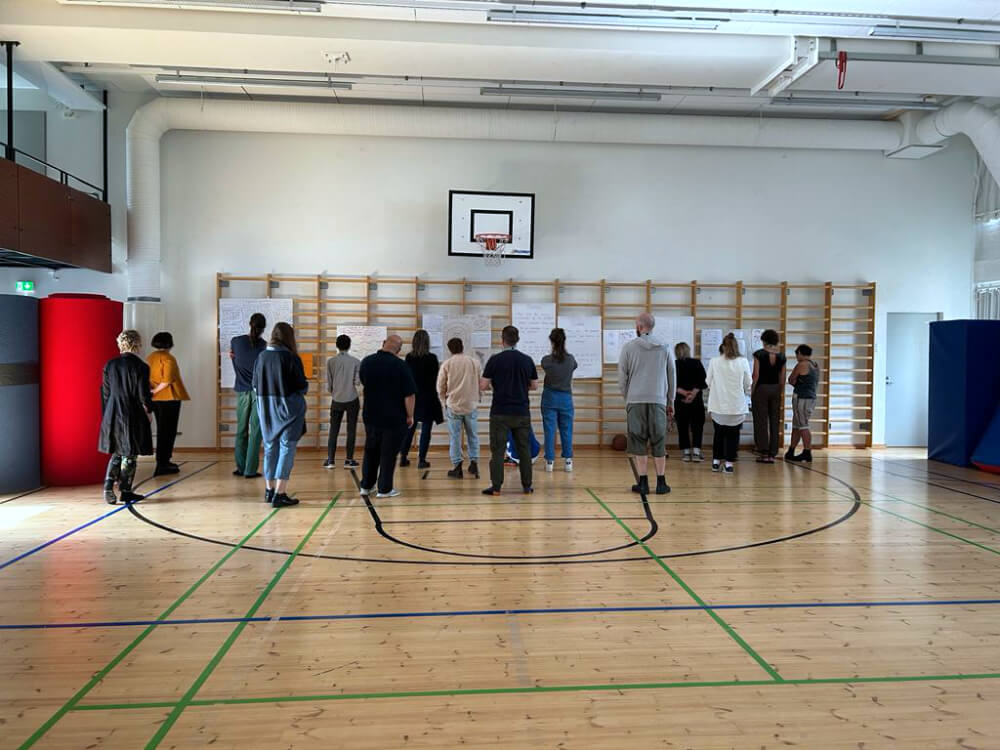
On identities and processes
How to write a text that is as multi-voiced and multilayered as a performance lecture? How to write a PhD thesis that is as multi-voiced and multilayered as a field of practice? How to bring personal experience into an academic thesis or an academic article? This lecture performance and consequently this text stems, on the one hand, from my PhD research at Utrecht University that focuses on unpacking the self-positioning of the dance dramaturg from the domain of the dramaturgical practices/dance studio (micro level), to the ecosystem of the performing arts field (meso), to the larger neoliberal project-based labor market (macro).[1] On the other hand, it stems from my practice of working as a dance dramaturg and a series of residencies I do as dramaturg-in-residence in collaboration with architect Chryssa Georgiou, in which we produce artifacts as bi-products of academic research that can stand on their own as autonomous dramaturgical objects. How can I transform my non-artistic PhD research on dramaturgy into an artistic research of dramaturgy? How can my identities as a practitioner dramaturg and an academic researcher cross-fertilize each other?
Wednesday 13 April 2022
Dear Lisa,
It is 10:27 p.m. and I’m lying down on the sofa of the Airbnb apartment while writing this letter. The day was long and only now that I finished everything else I had the chance to open this document to write. I’ve finally fully landed today. I immersed myself in my research, dealing with the actual content.
Today I’m thinking a lot about the labor of our field, of myself, of the dramaturg, and the researcher in general. It started from thinking how privileged I am for having this time and space for my research and my practice with this residency you offered me. It is very rarely the case that I consider studying for the PhD as working labor, and this residency does exactly that. It merges my working conditions with my research conditions. It gives visibility and value to the labor of the researcher.
Here is a list of questions that comes to mind about labor: What is the labor of the dramaturg? What is the labor of the researcher? How do you value that labor? What is my productivity as a dramaturg? Does labor only count if it is productive? How can I separate the labor of the dramaturg from the labor of the researcher? Why does it matter to separate them and for whom it matters?
It’s 11:21 and I’m going to abruptly close this letter to go to sleep cause I’m really surprised my brain still functions.
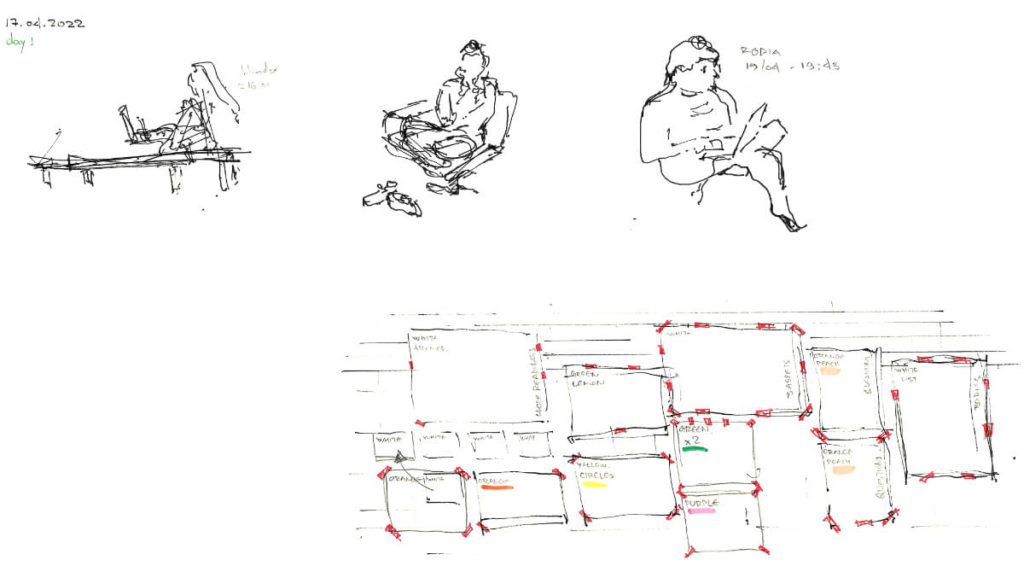
On (imaginary) partners in dialogue
I started experimenting with letter writing as a form of reflection during a residency in DansBrabant Tilburg (NL) in April 2022 where Lisa Reinheimer –the artistic coordinator of the dance house at that moment- invited me.[2] More than writing letters to her as a person, it became a space for me to reflect on both my research and my process. The format of the letter allows me to bring in an intimate tone while having clear external addressing as a way to have an (imaginary) partner in dialogue. Thus, it is not so much me Rodia writing to Lisa, but instead the figure of a freelance dramaturg and researcher writing to the figure of an artistic director of an institution. The letters became a dramaturgical tool to give an insight view into manifold processes: the actual content of the research on the self-positioning of the dance dramaturg as well as a meta-level of reflection on the process, making visible the labor of a PhD research and the dramaturg.
Working in combination with the visual material of the creative documentation by Chryssa – another partner in dialogue – they bring to the foreground qualities such as the personal, the extra-linguistic, the embodied, and the playfulness as inherent components of both academic research and dramaturgical work. I tackle assumptions, (re)presentations of research, and ways of producing knowledge. Under that light, dramaturgy becomes a practice of creating frameworks or conditions that trigger different kinds of processes and responses, interrupting the normative processes of thought and production.
Thursday 14 April 2022
Dear Lisa,
I really enjoyed the hour we spent together sitting outside under the sun writing to each other. You took this funny picture of me holding my head and having an overthinking face as if what I’m writing is the most important thing on the planet. The photo could be titled All of the Ph.D. process in one click or Drama PhD queen #PhDlife. It reminded me (again) that I have to take less seriously myself and my research. After all “it’s only a stupid dance” as Jonathan Burrows (2010, 29) says in A Choreographer’s Handbook. Well “it’s only a stupid PhD.”
The anticipation of our meeting brought to the center of my research the question: How the self-positioning of dramaturgs is affected by the positioning of the dramaturg done by others (choreographers, dancers, institutions, etc.), and what kind of negotiations that generate? Or in that specific case: in what way does the positioning of the dramaturg from dance houses affect the way that dramaturgs perceive and position themselves?
The question reads sharper than it actually is in our case because as an artistic director, you do position the dramaturg in a visible position. Personally, I have never felt as seen as a dramaturg by the way you approached me. You saw my job as a practice and you approached me in the same way as if I was a choreographer reaching out to your house for support. “Why not give a residency to a dramaturg?” –you said “dramaturgy is a practice in the same way that choreography is a practice and as a dance house we must support this practice as well.” The very fact that you offered me this residency, that you proudly called me “our first dramaturg-in-residence” and you asked me “What do you need? How can we help you as a house?” already empowers the positioning of the dance dramaturg in the field. Even more, you proposed a specific way of positioning of the dance dramaturg as a practitioner and as the center of attention and not only as the supporter of the choreographer.
I know that I’m running here the risk of this letter reading as a love letter, but believe me when I say it is not. It is a letter from a freelance dramaturg to an artistic director. From the dramaturg-in-residence to the artistic director of the house.
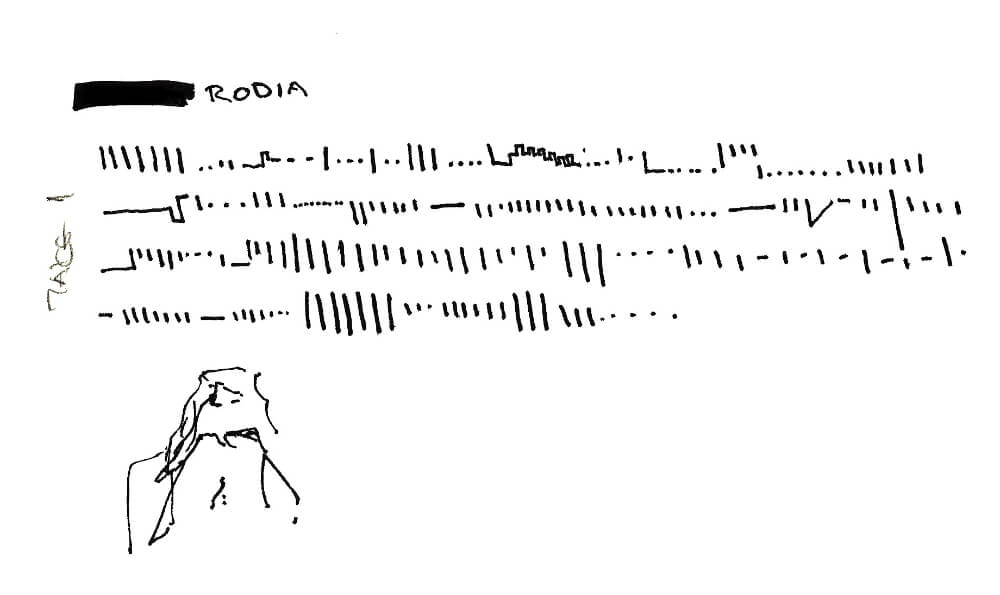
On self-positioning
Friday 15 April 2022
Dear Lisa,
Today was intense. It was as if the essence always slipped out of my hands; thoughts being entangled, not knowing from which entry point to approach them. Sometimes the research process seems as if I’m moving in circles. I miss the sharp corners of a triangle or a square. Anxiety hit me hard about the hosting of the focus group the coming Monday, about the responsibility and the exposure I put myself into with inviting these 10 dramaturgs to come all this way here to contribute to my research. I have to treat them back with at least an interesting session and a meaningful exchange between us. I’ve never done something like this before and today I second-guess myself for doing it now. I don’t feel ready enough, prepared enough, and knowledgeable enough.
A list of positioning answering the question:
How would you describe your positioning as a dramaturg in a creation process/studio?[3]
- outside the hierarchy of the group
- in the midst and once in a while with a step back to reflect
- at the ladder between the studio and the world
- with a certain distance
- trying to facilitate a shared dramaturgy
- ping-ponging
- giving feedback from all that has shaped me as a person professionally and personally
- holder of space for dialogue, feelings, conflicts, questions,
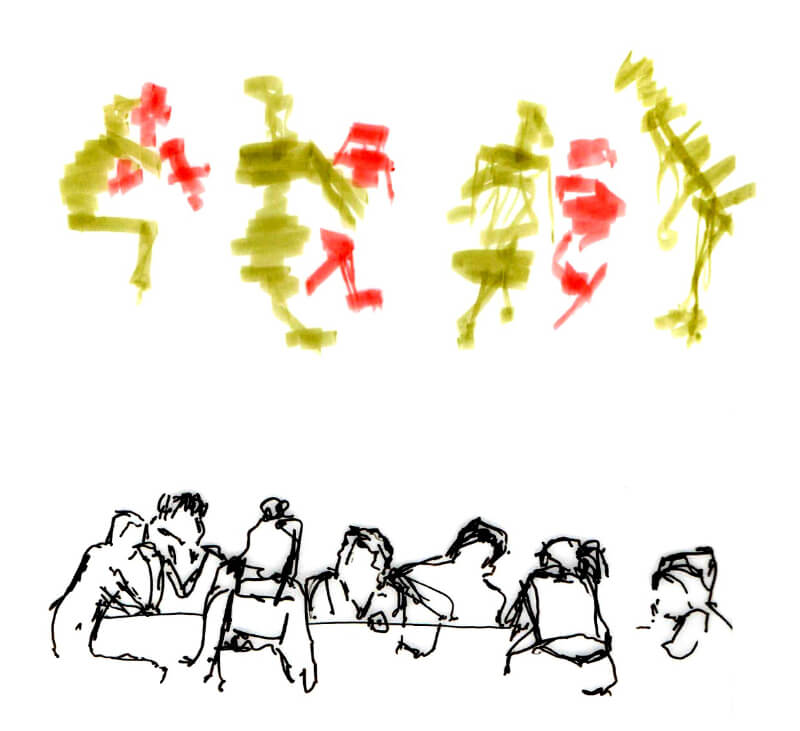
- imagining alongside
- not fixing
- alert
- curious
- transparent
- warm
- supportive
- available
- first audience member
- external question mark
- being a reminder
- From a mathematical perspective
- Partner
- Cleaner
- editor
- consultant
- weaver
- as a listener
- as a generous observer
- as a consciousness, as a presence, or maybe a conscious presence
- by being curious
- by being attentive
- by accepting what brought to the table
- by constantly repositioning
How does the positioning of the dance dramaturg come about? What does it look like? What are the mechanisms of self-positioning? In my research, self-positioning functions as a conceptual tool that allows us to deal empirically with how dance dramaturgs accomplish situated identities. To do so, I employ ethnographic and auto-ethnographic methods for a close examination and observation of the community and the practice. During the residencies, I engage in fieldwork – organization of focus groups, one-to-one interviews, observation of practices, etc. – that allow me to work from the inside, with a view from below, taking into account that the dramaturgs themselves are the experts in their field. I am interested in how dance dramaturgs practice positioning both consciously and intuitively, both following a specific agenda and “just being.” I look at work processes, working conditions, attitudes, and modes of working and living as a dance dramaturg within the greater sociopolitical context.
On peripheries and centers
Friday 18 August 2023
Dear Lisa,
Being here in this village house, in the periphery of the periphery, got me thinking again of these notions of the periphery and the center and how I use them in my research. I have chosen to explore the positioning of the dance dramaturg within the Dutch field of dramaturgy and the Greek field exactly because of the issues and questions they raise about the “periphery” and the “center” discussion. At first glance, Greece is placed in the periphery because of both its geographical position and its cultural and financial state, while the Netherlands with a stronger economy and cultural presence, falls into the Eurocentric paradigm. However, I’m trying not to use the scheme of the periphery and the center to reproduce the existing implications of the one-way dynamics or an evaluation system that suggests center=good VS periphery=bad. Instead, the reason I bring it into the discussion is to stress how local cultural conditions relate to a broader European context and a greater sociopolitical framework of neoliberalism. How can we identify common issues in different local contexts without losing sight of their specificity? Which categories, concepts, and terms about the dance dramaturg have been projected from Western European discourse into peripheralized scenes, and how have these notions been appropriated, recontextualized, and transformed? On the other hand, what kind of new categories, concepts, and terms about the position of the dance dramaturg the peripheralized scenes offer to the European discourse? Lastly, how does the positioning of the dance dramaturg function as an act of privilege and as an act of urgency?
Originally coming from Greece, studying and living in the Netherlands for three years, and being based between Athens and Amsterdam for the last few years, I consider myself to be part of this community of dramaturgs and the structures and conditions I am exploring. There is not such a thing as a clear separation between home and field of research. This auto-ethnographic approach at “homes,” allows me to bring together the voices of the theorist and the practitioner and to generate critical insights. As I am part of the practice and the community, I am both implicated in and a carrier of the knowledge of this community. I am continually coming and going to and from home(s), to and from the field(s). What happens when the field is also home? What happens when here and there contain both home and field?
I hear my mum from the inside of the house saying that dinner is ready so I’ll leave it here for now.
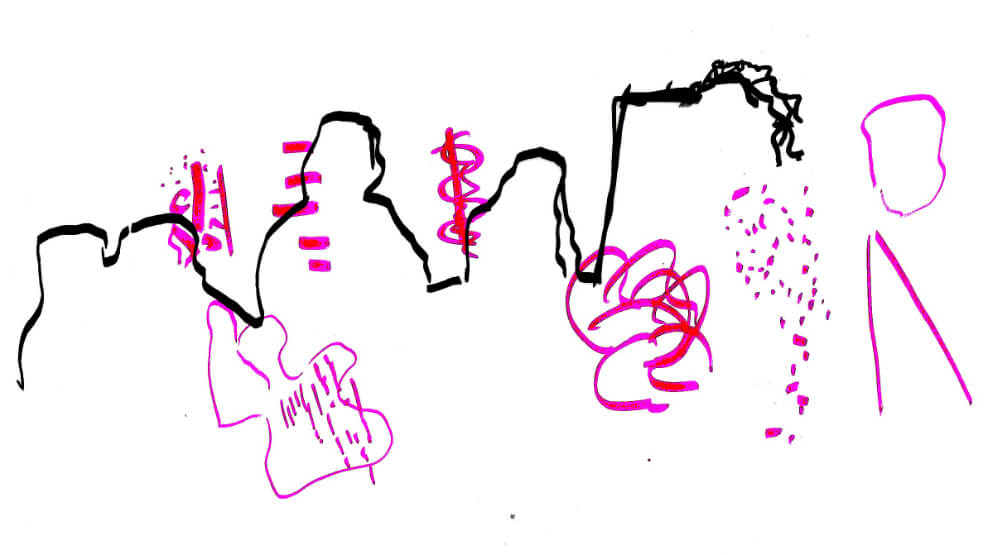
Intermission
Dear reader,
I know that you have already taken an overload of information. I know it seems fragmented and multi-layered. Therefore, I would like to do a small intervention here with a dramaturgical task: Ι invite you to do a conversation only in/with questions. Someone starts by posing a question that has emerged so far and then someone else poses another question related to the first one, and so on. Be careful not to ask fake questions (answering with a question mark) and to ask only open questions.[4] We have 10 minutes.
The PhD song
If you were to be in my performance lecture, my dear reader, and not in this text, you were now about to listen to a song. It is called The PhD Song.

It was during a workshop about performance making by the Cypriot choreographer Eleana Alexandrou that I first started experimenting with my PhD research as an artistic project. One of the tasks she gave us was an automatic writing task of answering in 2 minutes the questions “If my project was a non-human creature…” and “If my project was a song…” The combination of the two answers produced by this playful task turned into the lyrics of The PhD song, which turned into a sketch by Chryssa Georgiou, which turned into an actual song with music written by my dad who is a musician – during one of my DIY residencies in Pelion. But since this is just a text, you have to imagine it being sung by my dad. ♬♪♩
Thank you for being here!
Yours truly,
The dramaturg-researcher
Notes
1 I am an external PhD candidate in the Department of Media and Culture of Utrecht University under the supervision of Prof. Dr. Maaike Bleeker and Dr. Laura Karreman. Rodia Vomvolou Arsenopoulou – Universiteit Utrecht
2 Studio Sharing – Dance Brabant. Lisa Reinheimer is currently the director of Dansateliers Rotterdam (NL).
3 Between April and September 2022, I hosted 3 focus groups in Tilburg, Athens, and Prague (the last one as part of the European program Micro and Macro Dramaturgies in Dance) inviting local dance dramaturgs to discuss their position and practice. These are some of the answers to one of the questions.
4 This task is borrowed from the practice of Konstantina Georgelou, Danae Theodoridou, and Efrosini Protopapa. See more in: Georgelou et al. 2017.
References
Burrows, Jonathan. 2010. A Choreographer’s Handbook. New York: Routledge.
Georgelou, Konstantina, Efrosini Protopapa, and Danae Theodoridou. 2017. The Practice of Dramaturgy. Working on Actions in Performance. Amsterdam: Valiz.
Gielen, Pascal. 2009. The Murmuring of the Artistic Multitude. Global Art, Politics and Post-Fordism. Amsterdam: Valiz.
Contributor
Rodia Vomvolou
Rodia Vomvolou is a dance dramaturg and researcher based between the Netherlands and Greece. Her personal field of interest focuses on dramaturgy as a way of thinking and doing in the current sociopolitical context and knowledge economy. As a freelance dramaturg and mentor, Rodia collaborates with institutions, dance houses and universities in Europe, as well as with independent artists. She is currently doing PhD research on the self-positioning of the dance dramaturg in Utrecht University from where she also holds an MA in Contemporary Theatre, Dance and Dramaturgy.